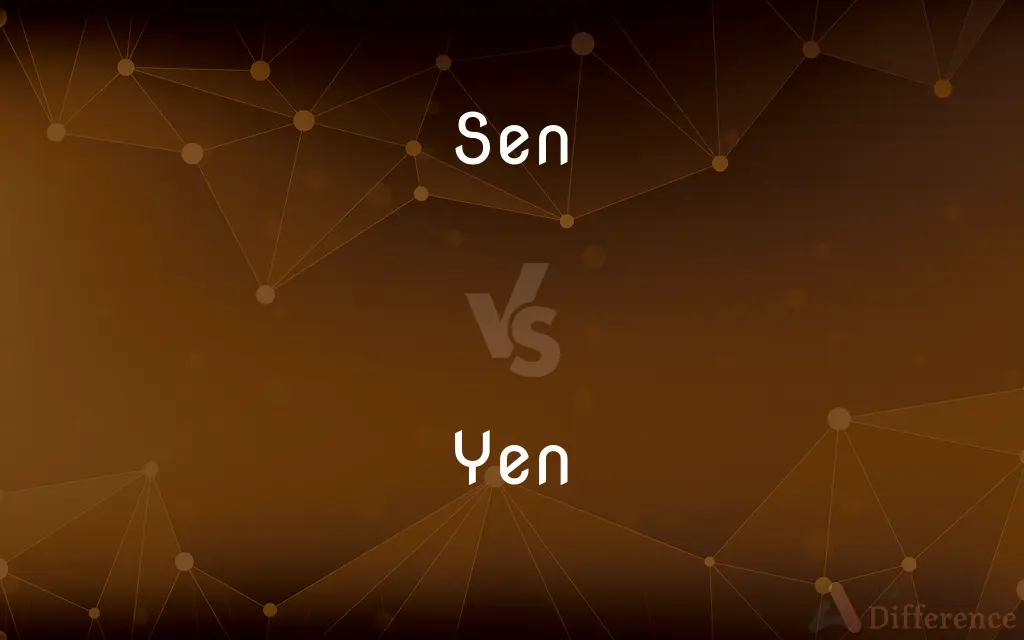Sen vs. Yen — What's the Difference?
Edited by Tayyaba Rehman — By Maham Liaqat — Updated on April 5, 2024
Sen and Yen are units of currency, with Sen being a smaller denomination once used in Japan, while Yen remains Japan's main currency unit.

Difference Between Sen and Yen
Table of Contents
ADVERTISEMENT
Key Differences
Sen is a historical unit of currency in Japan, acting as a subdivision, whereas the Yen is the current primary currency unit of the country, symbolizing its economic status both domestically and internationally. Sen, which is no longer in circulation, was valued at 1/100th of a Yen, reflecting its role in facilitating smaller transactions. On the other hand, the Yen, denoted by the symbol ¥, is actively used in all financial dealings, from everyday purchases to global trade.
While Sen provided a means for more precise pricing and transactions in smaller amounts, the Yen serves as a standard measure for larger financial activities and savings. The discontinuation of Sen in everyday transactions highlights the evolution of the Japanese economy and its adaptation to modern financial practices. Conversely, the Yen continues to adapt, with its value influenced by various factors including inflation, economic policies, and global market dynamics.
The historical presence of Sen in the Japanese currency system illustrates the country's rich monetary history and its journey towards modernization. Meanwhile, the Yen's prominence underscores Japan's current economic strength and its role in international finance. The transition from Sen to exclusive Yen usage reflects broader trends towards simplification and efficiency in currency systems worldwide.
In terms of collectibility and historical significance, Sen coins and notes represent a bygone era and are prized by numismatists, whereas Yen, as a living currency, symbolizes the ongoing story of Japan's economy. The tangible pieces of Sen offer a glimpse into the past, capturing moments of economic change, while the Yen continues to evolve, shaping and being shaped by Japan's economic future.
Understanding the relationship between Sen and Yen provides insights into Japan's economic development, from detailed transactions enabled by Sen to the broader financial landscape dominated by Yen. This evolution from using both Sen and Yen to the exclusive use of Yen mirrors changes in economic structures, practices, and the very fabric of daily life in Japan.
ADVERTISEMENT
Comparison Chart
Status
Historical currency unit, no longer in circulation.
Current primary currency unit of Japan.
Value
1/100th of a Yen.
Independent currency unit, basis of Japanese currency.
Usage
Used for smaller transactions and precise pricing.
Used for all types of financial transactions.
Symbol
None specifically, part of Yen (¥) system.
Denoted by the symbol ¥.
Collectibility
Prized by numismatists for its historical significance.
Less collectible, as it is the current currency in use.
Compare with Definitions
Sen
Economic Indicator.
The existence of Sen highlights the evolution of Japan's economy.
Yen
Subject to Inflation.
The Yen's value fluctuates with economic policies and global trends.
Sen
Historical Currency Unit.
A Sen was once used in Japan for small transactions.
Yen
International Currency.
The Yen is widely recognized and traded on global markets.
Sen
Out of Circulation.
Sen coins are no longer used in modern Japanese financial systems.
Yen
Current Usage.
All financial transactions in Japan are conducted with Yen.
Sen
Subdivision of Yen.
100 Sen made up a single Yen.
Yen
Primary Currency Unit.
The Yen is the main currency used in Japan today.
Sen
Collectible Value.
Numismatists seek out Sen coins for their historical significance.
Yen
Symbol of Economy.
The value of the Yen reflects Japan's economic condition.
Sen
A monetary unit of Brunei, Cambodia, Indonesia, and Malaysia, equal to one hundredth of a dollar in Brunei, one hundredth of a riel in Cambodia, one hundredth of a rupiah in Indonesia, and one hundredth of a ringgit in Malaysia.
Yen
The basic monetary unit of Japan.
Sen
A former monetary unit in Japan, equal to one hundredth of a yen.
Yen
A longing or yearning
She always had a yen to be a writer
Sen
A Japanese unit of currency equal to 1/100 of the yen.
Yen
Feel a longing or yearning
It's no use yenning for the old simplicities
Sen
A unit of currency equal to 1/100 of the primary unit of Indonesia and various other Southeast Asian countries.
Yen
A strong desire or inclination; a yearning or craving.
Sen
A unit of Japanese currency, worth one hundredth of a yen.
Yen
See Table at currency.
Sen
A coin of this value.
Yen
To have a strong desire or inclination; yearn.
Sen
Self.
"Hear all, see all, say nowt. Eyt all, sup all, pay nowt. An if ivver tha does owt fer nowt, mek sure tha does it fer thi sen."
Yen
The unit of Japanese currency (symbol: ¥) since 1871, divided into 100 sen.
Sen
A unit of Indonesian currency, worth one hundredth of a rupiah.
Yen
A coin or note worth one yen.
Sen
A unit of Malaysian currency, worth one hundredth of a ringgit.
Yen
A strong desire, urge, or yearning.
Humankind's yen for knowledge
Sen
A coin of this value.
Yen
(slang) Opium.
Sen
A unit of length equal 20 wa, 40 meters.
Yen
(transitive) To have a strong desire for.
Sen
A Japanese coin, worth about one half of a cent.
Yen
The unit of value and account in Japan. The yen is equal to 100 sen. From Japan's adoption of the gold standard, in 1897, to about 1913 the value of the yen was about 50 cents. In 1997 and 1998 the value of the yen varied from 80 per U. S. dollar to 120 per dollar.
Sen
Since.
Yen
A yearning for something or to do something
Sen
A fractional monetary unit of Japan and Indonesia and Cambodia; equal to one hundredth of a yen or rupiah or riel
Yen
The basic unit of money in Japan; equal to 100 sen
Yen
Have a desire for something or someone who is not present;
She ached for a cigarette
I am pining for my lover
Common Curiosities
Are Sen and Yen still used together?
No, Sen is no longer in circulation; the Yen is the only currency used.
Can I collect Sen coins?
Yes, Sen coins are collectible items, valued by numismatists for their historical significance.
Are there other subdivisions of the Yen?
Currently, the Yen does not have any subdivisions in practical use.
What is Sen?
Sen was a unit of currency in Japan, equivalent to 1/100th of a Yen, no longer in circulation.
Why was Sen discontinued?
Sen was phased out to simplify transactions and adapt to economic changes.
How do international markets affect the Yen?
The Yen is influenced by global economic trends, trade policies, and market demand.
How is the Yen denoted?
The Yen is denoted by the symbol ¥ in financial contexts.
What role does the Yen play in Japan's economy?
The Yen is crucial for all economic activities, from daily purchases to international trade.
What is the Yen?
The Yen is the primary unit of currency in Japan, used in all financial transactions today.
Is the Yen a strong currency?
The strength of the Yen fluctuates based on economic conditions and policies.
What does the presence of Sen in history indicate?
Sen indicates Japan's economic evolution and its transition to modern financial systems.
How do people in Japan view the Yen?
The Yen is viewed as a symbol of national economic identity and stability.
What impact did the transition from Sen to Yen have?
The transition simplified the currency system, reflecting and facilitating economic growth.
What can Sen coins tell us about Japan's past?
Sen coins offer insights into Japan's historical economic practices and transitions.
Has the value of the Yen been stable?
Like any currency, the Yen experiences fluctuations based on various economic factors.
Share Your Discovery

Previous Comparison
Brokerage vs. Broker
Next Comparison
Portobello vs. ShiitakeAuthor Spotlight
Written by
Maham LiaqatEdited by
Tayyaba RehmanTayyaba Rehman is a distinguished writer, currently serving as a primary contributor to askdifference.com. As a researcher in semantics and etymology, Tayyaba's passion for the complexity of languages and their distinctions has found a perfect home on the platform. Tayyaba delves into the intricacies of language, distinguishing between commonly confused words and phrases, thereby providing clarity for readers worldwide.














































